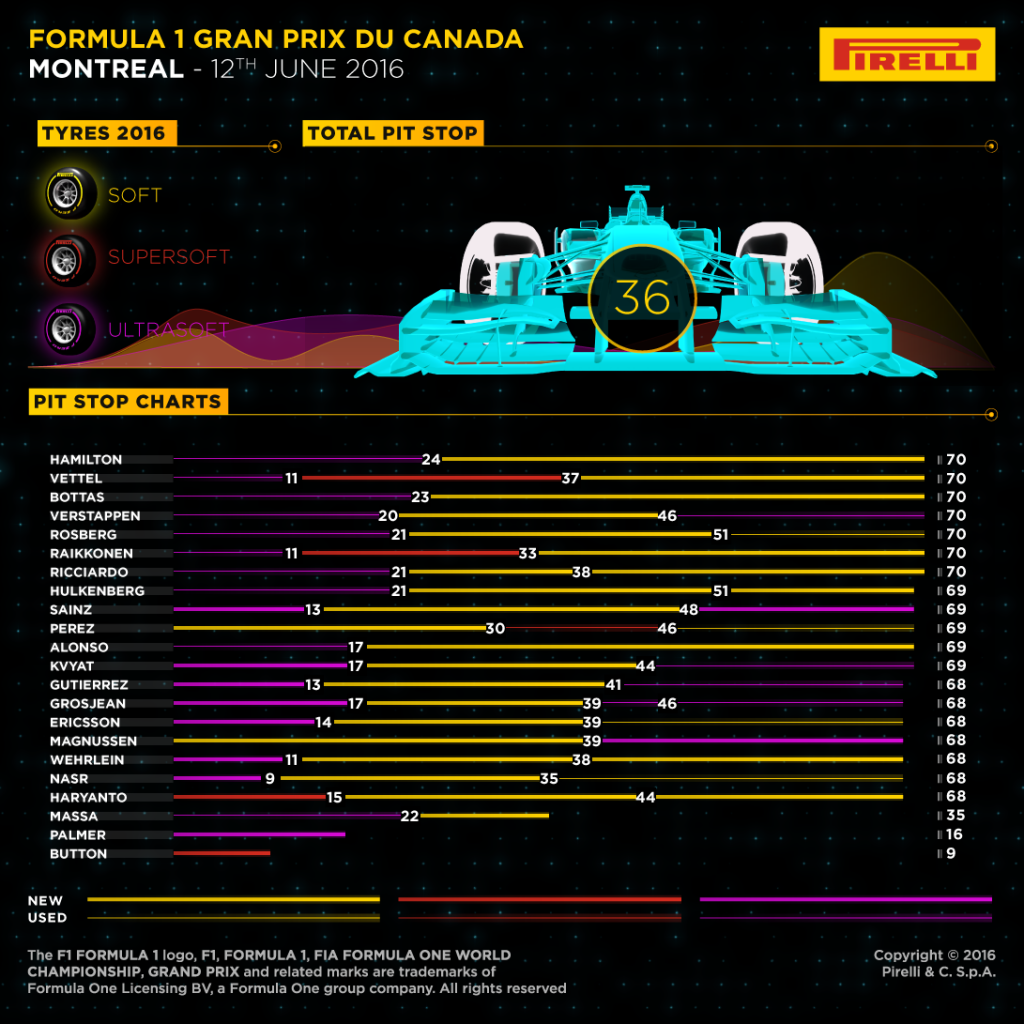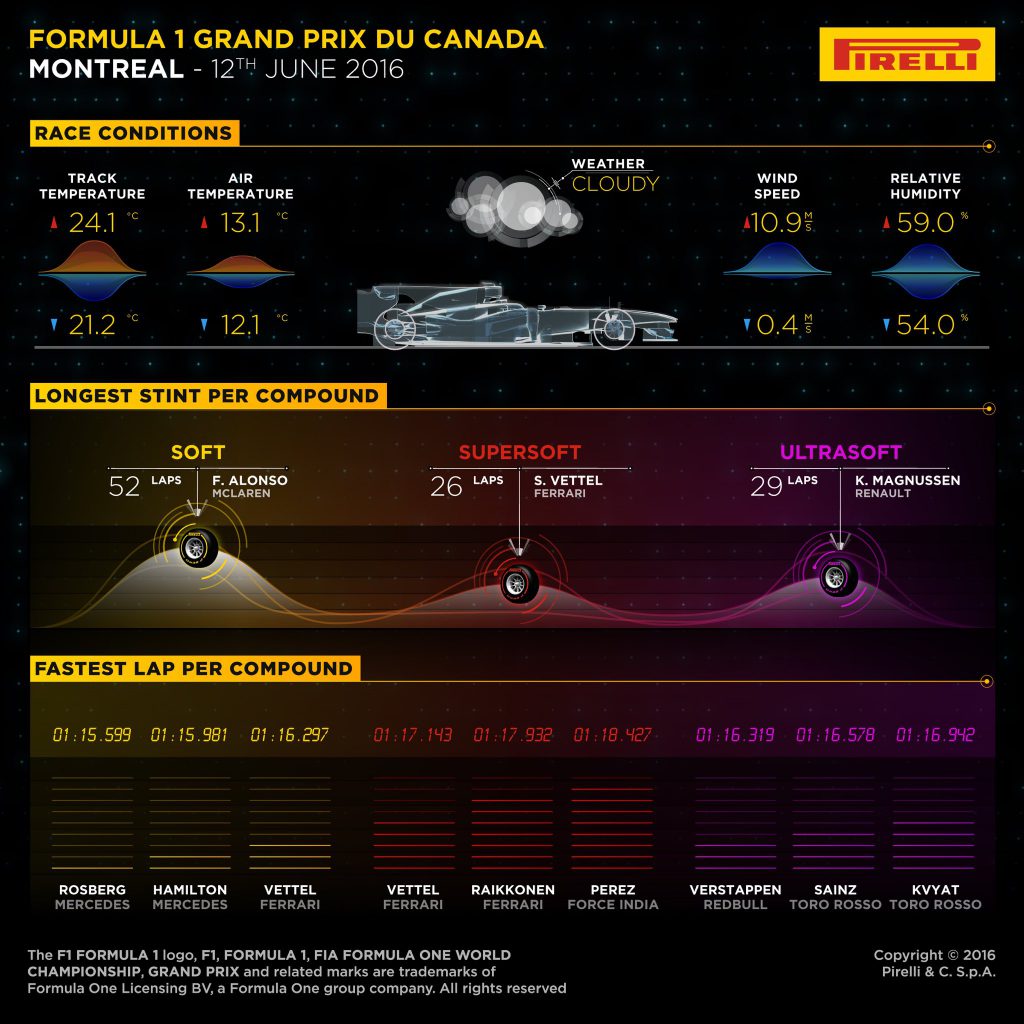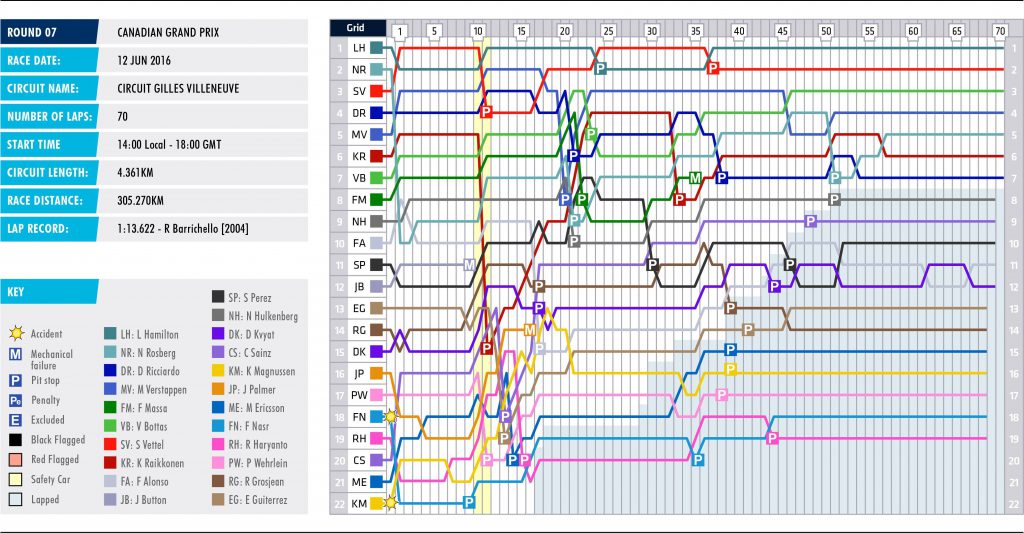Canadian Grand Prix 2016
14 Jun 2016
Race 7 – 70 Laps – 4.361km per lap – 305.270km race distance – low tyre wear
Canadian GP F1 Strategy Report Podcast – featuring Ernie Black the F1 Poet.
- Image: MONTREAL, QC – JUNE 12: Daniel Ricciardo of Australia driving the (3) Red Bull Racing Red Bull-TAG Heuer RB12 TAG Heuer and Max Verstappen of the Netherlands driving the (33) Red Bull Racing Red Bull-TAG Heuer RB12 TAG Heuer on track at the start during the Canadian Formula One Grand Prix at Circuit Gilles Villeneuve on June 12, 2016 in Montreal, Canada. (Photo by Mark Thompson/Getty Images)
Formula 1 travelled across the Atlantic Ocean to Montreal’s Circuit Gilles Villeneuve for the Canadian Grand Prix. The tricky, unforgiving and unusual circuit hosted the seventh round of the 2016 season and saw Lewis Hamilton claim his second win in a row.
Nico Rosberg’s advantage was severely cut by Hamilton’s victory, with the German coming home a distant fifth, with Sebastian Vettel, Valtteri Bottas and Max Verstappen between the Mercedes duo. Here are the major strategy stories and headlines from the Canadian GP weekend:
One vs two stop
Heading into the race, a one-stop strategy was said to be the quickest, due to low degradation rates and the durability of the two softest Pirelli tyre compounds – the super-soft and ultra-soft. A two-stopper was the more aggressive strategy and depended on drivers moving through traffic quickly, as well as getting tyres up to temperature quickly.
Hamilton and Vettel went for two very different strategies, with the Mercedes driver emerging in front. The W07 was clearly the quicker of the two cars, although the margin looked much smaller in Canada, but could Vettel have taken the fight to Hamilton in the same strategy?
He struggled to cut the gap after his second stop on the softs and his pace on the super-soft wasn’t anything to right home about, the middle tyre didn’t seem to work for most of the field. So it seems likely he could have been in a better position if he had stopped once, he was leading when he pitted anyway so would have had track position.
Interestingly Hamilton claimed after the race Mercedes were planning to two-stop the race but opted to pit just once after seeing Vettel stop surprisingly early, switching strategy. It worked out for the Englishman. With low tyre degradation, cooler conditions and the Mercedes’ strong pace, it proved to be the best option for him. There wasn’t much between a one and two stop but it appears Ferrari once again made the wrong call.
Not quite ultra-soft enough?
The ultra-soft tyre is meant to be the softest in Pirelli’s range but it seems to be lasting quite some distance. During its appearances so far in F1, the compound has been used extensively and has proved to last far longer than some were expecting. For example, Kevin Magnussen was able to do 29 laps on his set of ultra-softs during the Canadian GP, many others went well past the 20-lap mark.
The super-soft is also holding up quite well in terms of durability and degradation, although performance is less favourable and it wasn’t used much in Montreal. This partly due to the fact teams had to put two sets of soft tyres aside for the race and use at least one (rather than having two compounds nominated and having to use both, weirdly) so the ultra-soft was the better option for a second tyre.
It begs the question, are these tyres too durable? They seem to not be soft enough. Drivers have said they want a more aggressive ultra-soft tyre, they want more performance and higher wear. That’s what they expect from the softest compound in the Pirelli range. Perhaps durability was helped by the cooler conditions in Canada and it will be different in warmer climates, but Pirelli needs to take a look into this and see what can be done for next year to create more of a difference between the compounds.
Perez doesn’t make it work
Sergio Perez was one of the drivers with free tyre choice, having not made it through to Q3, to start the race on the soft tyre. It looked like the decision could pay off, the Force India and Perez in particular has completed some great stints during the season so far on the softs and doing something different in Canada can have a big impact on the end position.
However, Perez struggled to make the alternative strategy work, particularly with getting heat into the soft tyres during the opening stint. He admitted after the race the decision to go soft, super-soft and soft on strategy (a two-stop) was probably the wrong one. Starting 11th and the first of the free tyre choice drivers, he had a real chance to challenge for good points but in the end he had to settle for 10th – not helped by getting stuck in traffic and a slow pitstop.
Ricciardo stuck in traffic
Daniel Ricciardo looked to be on a good strategy but traffic during his stints negatively impacted his race and this meant he finished down in seventh, having started in fourth. He lost ground at the start, falling behind his team-mate, and looked the quicker Red Bull in the early stages, but he struggled to pass other cars and get in clean air.
Tyre wear was low, but being stuck behind traffic sped the process up for Ricciardo and a lock-up on the softs didn’t help matters either. A two-stop race with one ultra-soft stint and two soft tyre stints on paper looked to be almost ideal but a number of factors meant that simply wasn’t the case for Ricciardo.
Williams rule the pitlane
The Williams team has found the sweet spot with its pitstops, to the point where it took the DHL Fastest Pit Stop Award for the seventh consecutive race in Canada. Valtteri Bottas had four tyres changed in just 2.11 seconds in Montreal and the consistent nature of the Williams pitstops is giving them a small but handy advantage in the race.
Jack Leslie @JackLeslieF1
Longest Stints
Soft: Alonso (52 laps)
Supersoft: Vettel (26 laps)
Ultrasoft: Magnussen (29 laps)
Most Stops
Grojean (3 – including drive-throughs)
All the Data
Thanks to Pirelli Motorsport for the detailed infographics


Stints by Driver
|
|
|||||||||||||||||||||||||||||||||||||||||||||||||||||||||||||||||||||||||||||||||||||||||||||||||||||||||||||||||||||||||||||||||||||||||||||||||||||||||||||||||||||||||||||||||||||||||||||||||||||||||||||||||||||||||||||||||||||||||||||||||||||||||||||||||||||||||||||||||||||||||||||||||||||||||||||||||||||||||||||||||||||||||||||||||||||||||||||||||||||||||||||||||||||||



 Safety Car
Safety Car 3. Ricciardo
3. Ricciardo 5. Vettel
5. Vettel 6. Rosberg
6. Rosberg 8. Grosjean
8. Grosjean 9. Ericsson
9. Ericsson 11. Perez
11. Perez 14. Alonso
14. Alonso 19. Massa
19. Massa 33. Verstappen
33. Verstappen 88. Haryanto
88. Haryanto
